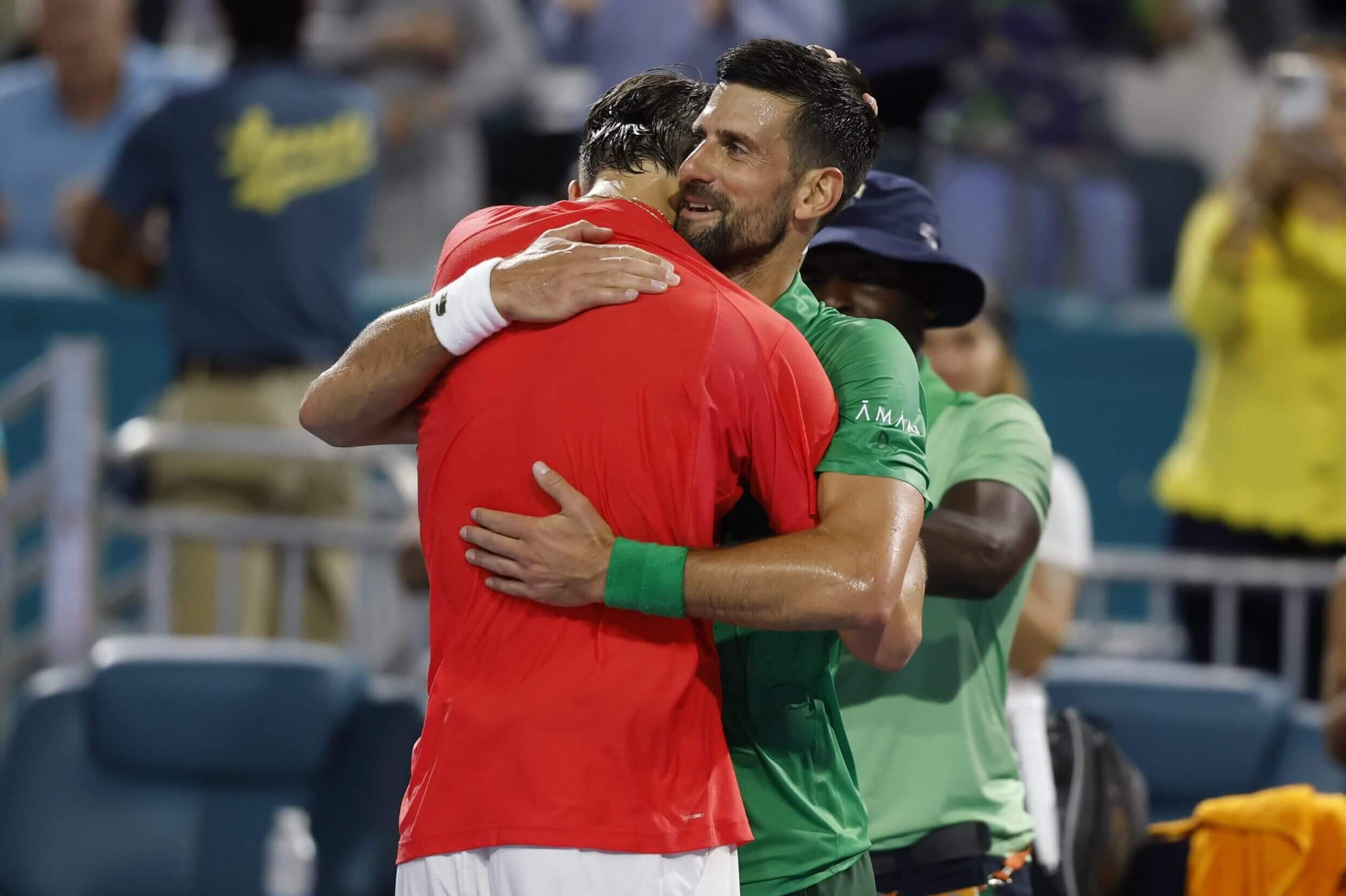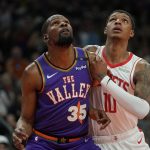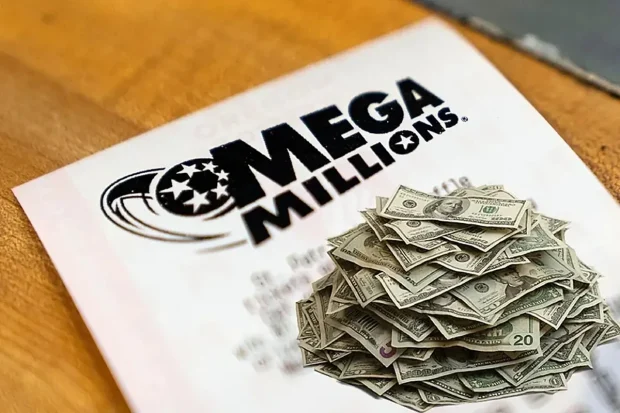
Novak Djokovic has experienced just about everything in his career, and now he has one more experience to add to it.
On Sunday night, Jakub Menšík beat Djokovic 7-6(4), 7-6(4) in the Miami Open final at Hard Rock Stadium to win his first-ever Masters 1000 in Miami and first ATP title.
“Never really happy to lose, but he’s one of the very few players that I would be happier to lose to, to be honest,” Djokovic said in his post-match news conference.
The Student Becomes The Master(s) Champion 🏆
The moment @mensik_jakub_ completed his 7-6 7-6 victory over Novak Djokovic! #MiamiOpen pic.twitter.com/GDqFHrvsPB
— Tennis TV (@TennisTV) March 31, 2025
Djokovic was full of praise for Menšík, someone he has known for several years. As he often does with promising young players, especially those from Eastern and central Europe, Djokovic invited Menšík to join him for several training blocks at his club in Belgrade when Menšík was 16 years old.
“I could see back then already that three, four years ago that he’s going to be, you know, one of the top players of the world,” Djokovic said. “He’s got the complete game. Obviously, his serve is incredible, powerful, precise, wins a lot of free points with the first serve. Backhand, as well. Czech school they always have a great backhand. But forehand, he’s improved a lot. And movement for a tall, big guy like that, he slides and moves well. He still can improve, of course. So I’m sure we’ll be seeing him around.”
Advertisement
As for himself, Djokovic said he was disappointed with the end. He didn’t want to get into trouble with his eye that had hampered him and the weirdness of the day. Both players had to manage the rain delay and the smothering humidity.
Still, it will likely take a beat for him to move on from the frustration of having been so close — a couple of points in a couple of tiebreaks and he has his 100th tour title, a seventh in Miami and an exclamation point at the end of a loud message that would have echoed through the locker room. No one is better at tiebreaks than Djokovic, and he lost two in one night.
Instead, he’ll have to find contentment with the reminder he can once more play within a few whispers of the finish line and walk through a stadium as tennis royalty rather than an older player searching for something that once was but may not be again.
“It was an amazing run,” he said. “Unfortunately ended with a loss in the finals, but I played some really good tennis up to today.”

Jakub Menšík receives the Butch Buchholz Trophy after defeating Novak Djokovic. (Chris Arjoon / Icon Sportswire via Getty Images)
Trying to win his 100th ATP Tour title, Djokovic ran into both the power and precision of the rising 19-year-old Czech and the bad luck of having a stye emerge just under his right eye, causing discomfort, especially given that Djokovic plays in contact lenses.
The way Menšík, the big-hitting world No. 54, has played the past two weeks, Djokovic might have lost anyway, but the issues with his vision certainly didn’t help. Djokovic spent much of the night twitching with his eyes, opening and closing them as he tried to focus on Menšík’s lightning serves and heavy strokes. The combination proved to be just a bit too much on a damp, humid night of play that came after a rain delayed the scheduled start time for more than five hours.
The loss to Menšík was more than just a missed golden opportunity to win his 100th ATP Tour title and his 41st Masters 1000. And how golden it was.
Advertisement
Djokovic cruised to his first ATP Tour title since November 2023 without beating anyone of particular note, at least for him. He beat Grigor Dimitrov, the world No. 15, in the semifinals. But Djokovic is now 13-1 against Dimitrov in his career.
He beat Sebastian Korda in the quarterfinals. Korda is the world No. 25, but Djokovic has never lost to him.
He beat Lorenzo Musetti, the world No. 16, in the fourth round, improving to an 8-1 record against the Italian in the process. Musetti put up about as much resistance as a swinging door.
Menšík may be one of the top players in the world one day. He has a fearsome serve, that he can blast at 135 mph or kick into the sidewall. Still, on Sunday, he was also a 19-year-old ranked 54th in the world playing the greatest player of the modern era. Against a competitor who has seen two generations try to knock him off the top of the mountain and has beaten them back.
And against a player who now stays hungry, in part, by trying to beat back a third, comprised of eager teenagers looking for a story to tell their grandchildren one day and the two players, in Jannik Sinner and Carlos Alcaraz, who can really hurt him on a consistent basis. While anyone can only beat the players on the other side of the net, it’s hard to imagine many more opportunities for Djokovic to win a title as important as Miami without facing Alcaraz, Sinner or anyone else in the top 14 along the way.
Neither were there to trouble him in Miami. It’s not Djokovic’s fault that Alcaraz barely showed up for his opening-round match against David Goffin. Or that Sinner has been sidelined for three months on an anti-doping ban. Or that Alexander Zverev, the world No. 2, left his game in Australia and frittered away a third-set lead in his quarterfinal against Arthur Fils.
Advertisement
So while Djokovic’s runners-up trophy in Miami is not as powerful a message as it could have been, it is a message nonetheless. For months now, other players have been feeling like Djokovic can be had on any given day. He may still be capable of sublime tennis, but with each passing month he has seemed less likely to play it. He hadn’t lost his swagger, but the aura of invincibility he had a little more than a year ago was gone.
Djokovic said as much after his win over Musetti.
“I do hope and wish for Novak that you saw tonight, and then at the same time, I worked hard not to have the Novak that was playing in Indian Wells,” Djokovic said that evening.
“The continuity or consistency of the level of tennis nowadays for me is more challenging than it was 10 years ago, five years ago, and I know that. That’s definitely not due to lack of hours spent on the practice court and in the gym because I still keep the dedication. It’s there, but it just makes it a bit more challenging for me to maintain the level.”
His time in Florida proved that, and it proved that any reports of his impending demise from three weeks ago, when “the Novak that was playing in Indian Wells” capitulated to a second-round defeat to Botic van de Zandschulp at the BNP Paribas Open, were greatly exaggerated. Elite athletes on the wane do not lose their apexes. Finding them with regularity just gets harder.
Last year, Djokovic suffered a similar upset in the California desert. He sulked off to Miami that time, where he did some sponsor appearances but pulled out of the tournament.
This time, he buckled down for two weeks of practice with Andy Murray, the one-time rival who has become his coach. He found his hunger and his feel, and when he took to the teal and blue court of Hard Rock Stadium, he played almost perfect tennis.
Advertisement
Serena Williams came to watch a match. So did Lionel Messi. Djokovic said he felt the pressure of the greatest in their games watching. Disappointing them would have been poor form.
He didn’t disappoint them, setting himself on his way to sending his message — I may be creeping up on my 38th birthday, but I’m not dead yet.

Novak Djokovic hugs Jakub Menšík after their Miami Open final at Hard Rock Stadium. (Geoff Burke / Imagn Images)
But then came Menšík, another young buck trying to get to where Sinner and Alcaraz already are and move tennis further past the era of the ‘Big Three.’ Djokovic had beaten Menšík in China in the fall. But after his win in the semifinals in Miami over Taylor Fritz, Menšík declared himself ready to take on the best once more. He said he was a different player — smarter, more experienced, better.
He proved that on Sunday night, after battling his nerves all afternoon and evening as the players waited for the skies and the stadium court to clear so they could take the stage. He admitted that before all this began, he went to the tournament referee’s office with a sore knee and the intention to pull out of the tournament. Had he arrived at the office a bit earlier, or a bit later — or at least not when they were having lunch — he would not have found himself flat out on the court with delight, when another Djokovic return of a flashing serve missed its mark on match point.
The loss once more calls into question whether Djokovic can get back to the top of the game. As the tour moves to the red clay of Europe, Djokovic plans to play the three ATP 1,000 events in Monte Carlo, Madrid and then Rome.
While he has won Monte Carlo twice and Madrid three times, he’s often been not great at either competition as he finds his form. By the time he gets to Rome though, he’s often sliding and shaping the ball on clay as well as anyone not named Rafael Nadal ever has.
Then it’s on to Roland Garros in Paris. The last time he was there, he played one of the greatest matches of his career to win the Olympic gold medal, beating Alcaraz in two tiebreaks, in a two-set match that lasted nearly three hours.
Advertisement
The time before that, he had to pull out of the French Open quarterfinals, after tearing the medial meniscus in his right knee midway through a fourth-round win over Francisco Cerundolo. Less than four weeks later, he returned to the grass of Wimbledon, where he made it all the way to the final before Alcaraz mowed him down on the most famous lawn in tennis.
Then again, there may not be an athlete on the planet who relishes finding new challenges and overcoming them more than Djokovic does. That has been one of the keys to his longevity during a career that has spanned two decades. It has had its share of moments in which he needed to find some reason to keep going.
A hunt for consistency, the thing he is finding reason in now, might not sound as sexy as knocking off a new generation of all-time greats. But one can’t happen without the other.
Djokovic knows that better than anyone, which is why he has filled his schedule with more tournaments than in recent years. In Miami, where he came oh so close to winning his first tour title in nearly a year and a half, that may have been his most important message of all — he is hunting once more.
(Top photo: Matthew Stockman / Getty Images)
This news was originally published on this post .








Be the first to leave a comment